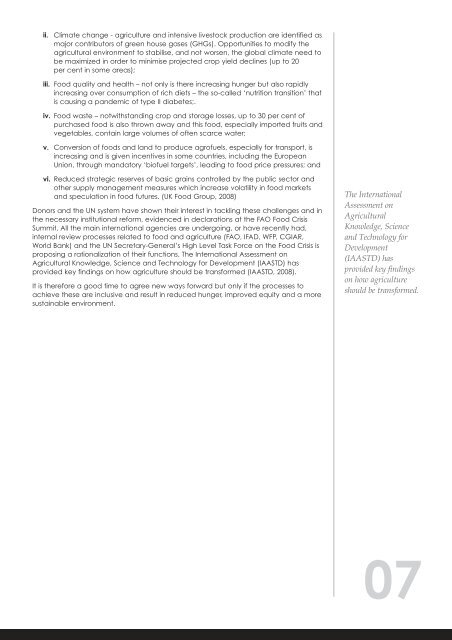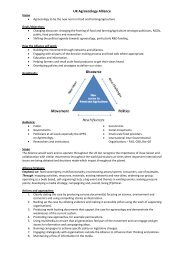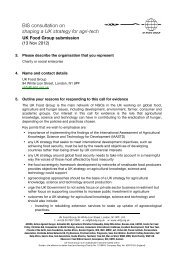More Aid for African Agriculture: policy options for ... - UK Food Group
More Aid for African Agriculture: policy options for ... - UK Food Group
More Aid for African Agriculture: policy options for ... - UK Food Group
Create successful ePaper yourself
Turn your PDF publications into a flip-book with our unique Google optimized e-Paper software.
ii. Climate change - agriculture and intensive livestock production are identified as<br />
major contributors of green house gases (GHGs). Opportunities to modify the<br />
agricultural environment to stabilise, and not worsen, the global climate need to<br />
be maximized in order to minimise projected crop yield declines (up to 20<br />
per cent in some areas);<br />
iii. <strong>Food</strong> quality and health – not only is there increasing hunger but also rapidly<br />
increasing over consumption of rich diets – the so-called ‘nutrition transition’ that<br />
is causing a pandemic of type II diabetes;.<br />
iv. <strong>Food</strong> waste – notwithstanding crop and storage losses, up to 30 per cent of<br />
purchased food is also thrown away and this food, especially imported fruits and<br />
vegetables, contain large volumes of often scarce water;<br />
v. Conversion of foods and land to produce agrofuels, especially <strong>for</strong> transport, is<br />
increasing and is given incentives in some countries, including the European<br />
Union, through mandatory ‘biofuel targets’, leading to food price pressures; and<br />
vi. Reduced strategic reserves of basic grains controlled by the public sector and<br />
other supply management measures which increase volatility in food markets<br />
and speculation in food futures. (<strong>UK</strong> <strong>Food</strong> <strong>Group</strong>, 2008)<br />
Donors and the UN system have shown their interest in tackling these challenges and in<br />
the necessary institutional re<strong>for</strong>m, evidenced in declarations at the FAO <strong>Food</strong> Crisis<br />
Summit. All the main international agencies are undergoing, or have recently had,<br />
internal review processes related to food and agriculture (FAO, IFAD, WFP, CGIAR,<br />
World Bank) and the UN Secretary-General’s High Level Task Force on the <strong>Food</strong> Crisis is<br />
proposing a rationalization of their functions. The International Assessment on<br />
Agricultural Knowledge, Science and Technology <strong>for</strong> Development (IAASTD) has<br />
provided key findings on how agriculture should be trans<strong>for</strong>med (IAASTD, 2008).<br />
It is there<strong>for</strong>e a good time to agree new ways <strong>for</strong>ward but only if the processes to<br />
achieve these are inclusive and result in reduced hunger, improved equity and a more<br />
sustainable environment.<br />
The International<br />
Assessment on<br />
Agricultural<br />
Knowledge, Science<br />
and Technology <strong>for</strong><br />
Development<br />
(IAASTD) has<br />
provided key findings<br />
on how agriculture<br />
should be trans<strong>for</strong>med.<br />
07





